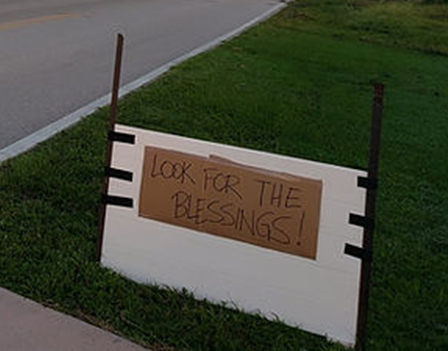Why Did Jesus Say It?
- myhighplaces22
- Jun 2, 2023
- 4 min read
Updated: Jun 9, 2023
Story by Randy Grathen
When Laurie and I moved to Camdenton, Missouri we started church shopping. We attended several. Organ music with a full choir, and gospel hymns. Non-denominational Contemporary-Christian music complete with guitars and drums. Fire and Brimstone preaching, including ‘you’re going to hell if you have guitars and drums in church.’ Huge churches named after a saint with stained glass windows and very ceremonial services. But I'd heard all the same preaching before. I wasn’t being challenged to grow.
We started going to one church because of their praise and worship music. Laurie and I had been in a band, and years later we lead a praise team at church. This was good contemporary praise and worship music done right. Not a rock concert followed by a sermon.
I had never heard of Life-applications teaching where the pastor reads several passages of scripture and then tells me how those passages applied to my daily life in the 21st century. After several months I began to wonder how can the pastor tell me how something applies to me? He doesn’t know my past, doesn't know me now, or anything about me. What I wanted to know was why God put that passage in scripture in the first place. I can figure out how it applies to me on my own.
God doesn’t waste time on idle talk. He’s way too busy running the universe and He's got His hands full trying to keep us out of trouble and out of hell. So, if everything, every word, in the bible was God inspired, then it must be important and more importantly timeless.
2 Timothy 3:16-17 tells us "All Scripture is God-breathed and is useful for teaching, rebuking, correcting and training in righteousness, 17 so that the servant of God[a] may be thoroughly equipped for every good work.
One of our friends at church had been a traveling evangelist and occasionally would preach. One Sunday he read this passage, “My sheep hear my voice, and I know them, and they follow me…” John 10:27. He and his wife had lived overseas and had firsthand knowledge of what shepherding sheep was like. He described sheep in one word – ‘stupid.’ They are always getting into trouble, wandering away from the flock, getting lost. Falling down hills or into a ravine. They had to be constantly watched, led, and protected from themselves, danger and predators.
When a shepherd led his flock into town to resupply or transact business, his sheep were corralled in a communal pen to protect them from predators and thieves. His sheep could be mixed in with a dozen other flocks. But, when the shepherd was ready to head back to the hills, he would stand at the entrance of the corral and call to his sheep, and they would come. No one else could call his sheep out. They only recognized their master’s voice. And that is when the lightbulb clicked on. This is what I was looking for. Now I understood the amazing relationship between us and Jesus in this metaphor. Jesus is called a shepherd 15 times in the first four book of the New Testament. If God says something once it's significant. More than once it's bedrock information.
God didn’t use a cookie cutter when he made us. We are all made different and unique. We all learn differently but for me, once I understand the historical context, I can figure out how it applies to me.
Many people have seen a picture of Jesus carrying a lamb on His shoulders. But few know the meaning behind it. The answer is found in the story “The Lamb’s Broken Leg” by William Branham.

There is an old shepherd story that was told in Jerusalem in the Holy Lands, of a shepherd packing a sheep.
Another shepherd asked, “What are you packing it for?”
“It’s got a broken leg.”
“How did it do that? Fall over a cliff?”
“No, I broke its leg.”
The other shepherd said, “Why, you’re a cruel shepherd to break that sheep’s leg.”
“No, I love it. It was going astray, and I couldn’t make it obey me, so I broke its leg so it would have to depend on me. I carry it, feed it, and stay close to it. Through this process, it will learn to depend on me, look to me and stay with me.”
This story made me understand why God has to discipline me. What loving parent doesn’t discipline his child when he gets out of hand? It’s His way of telling me, “My child, you are being disobedient. I have to do this for your own good.”
Thank you Lord, for the love and discipline. Please cause me to hear you clearly and to obey your commands. Amen.
To learn more about The Virtual Assistant’s Collection - click here
Postscript:
My sister Kristine sent this right after I published this story. I think it is an important addition.
She teaches Adult Sunday School classes at her church. She wrote this comment on the Our High Places website. I had to share this. How timely.
Hey Randy – loved this piece!! We recently had a similar lesson in SS, related to our dependence on our unique Good Shepherd. There were 5 points: 1~ They are not trainable – they do not “remember.”
2~ Sheep on their backs cannot right themselves, so need the Shepherd to help them up.
3~ Sheep are led, not driven. If pushed from behind, they scatter.
4~ Sheep are not burden-bearing animals. A heavy burden would break their backs.
5~ Sheep need daily care and attention, they rub against the shepherd’s leg, waiting for a pat on the head - the shepherd’s touch satisfies them. So, sheep follow, get lost, fall, eat, get fat, grow wool. After hearing about all the effort it takes to raise sheep, I wondered aloud, is it worth it?? Apparently God thinks we are. 😊 Love you!
For more stories from Our High Places website - click here
To join Our High Places Facebook - click here




Hey Randy – loved this piece!! We recently had a similar lesson in SS, related to our dependence on our unique Good Shepherd. There were 5 points:
1~ They are not trainable – they do not “remember” 2~ Sheep on their backs cannot right themselves, so need the Shepherd to help them up. 3~ Sheep are led, not driven. If pushed from behind, they scatter. 4~ Sheep are not burden-bearing animals. A heavy burden would break their backs. 5~ Sheep need daily care and attention, they rub against the shepherd’s leg, waiting for a pat on the head - the shepherd’s touch satisfies them.
So sheep follow, get lost, fall, eat, get fat, grow wool.After hearing about all the effort…